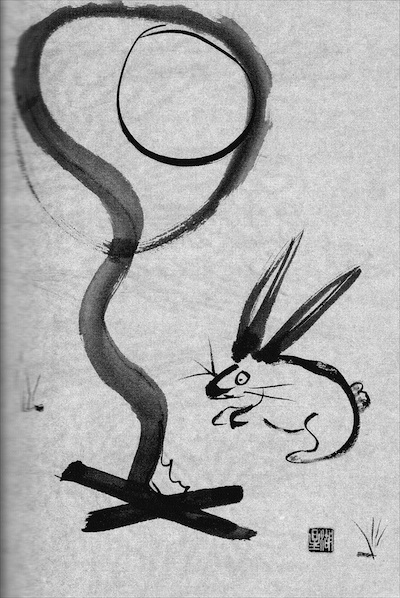This tale, retold by Zen monk-poet Ryokan (c. 1758–1831), draws on an old Chinese legend of a rabbit who lives in the moon. It is one of many Jataka tales, stories of Shakyamuni Buddha’s previous lives that illustrate acts of selflessness.
It took place in a world
long long ago
they say:
a monkey, a rabbit,
and a fox
struck up a friendship,
mornings
frolicking field and hill,
evenings
coming home to the forest,
living thus
while the years went by,
when Indra,
sovereign of the skies,
hearing of this,
curious to know
if it was true,
turned himself into an old man,
tottering along,
made his way to where they
were.
“You three,”
he said,
“are of separate species,
yet I’m told play together
with a single heart.
If what I’ve heard
is true,
pray save an old man
who’s hungry!”
then he set his staff aside,
sat down to rest.
Simple enough, they said,
and presently
the monkey appeared
from the grove behind
bearing nuts
he’d gathered there,
and the fox returned
from the rivulet in front,
clamped in his jaws
a fish he’d caught.
But the rabbit,
though he hopped and hopped
everywhere
couldn’t find anything at all,
while the others
cursed him because
his heart was not like theirs.
Miserable me!
he thought
and then he said,
“Monkey, go cut me
firewood!
Fox, build me
a fire with it!”
and when they’d done
what he asked,
he flung himself
into the midst of the flames,
made himself an offering
for an unknown old man.

When the old man
saw this
his heart withered.
He looked up to the sky,
cried aloud,
then sank to the ground,
and in a while,
beating his breast,
said
to the others,
“Each of
you three friends
has done his best,
but what the rabbit did
touches me most!”
Then he made the rabbit
whole again
and gathering the dead body
up in his arms,
took it and
laid it to rest
in the palace of the moon.
From that time till now
the story’s been told,
this tale
of how the rabbit
came to be
in the moon,
and even I
when I hear it
find the tears
soaking the sleeve of my robe.
Reprinted from Ryokan: Zen Monk-Poet of Japan, translated by Burton Watson, with permission from Columbia University Press.
Thank you for subscribing to Tricycle! As a nonprofit, we depend on readers like you to keep Buddhist teachings and practices widely available.